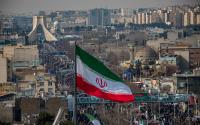Common DreamsJune 17, 2003
In the latest US ground strikes against Iraqi "militants" such as yesterday's raid on Falluja, the local people have used signaling systems - including lights and colored flares - when the American forces approach. These signals, says the US command, are evidence of civilian collusion with "Ba'athist fighters" in their midst, further proof that tough action is justified. The citizens of Falluja and elsewhere have a simpler explanation: they need to warn their neighbors to take cover from an invader who, in the words of its commander Lt Gen David McKiernan, will "strike hard and with lethal force" whenever it thinks fit.
These ambiguities are familiar in any situation when an occupying army is confronted by resistance on the ground. Some of those targeted over the last few days in the Sunni strongholds north of Baghdad may indeed be "Saddam loyalists". Others will be ordinary people shot because they were misidentified or in the wrong place, whose tragedies quickly become a footnote in last week's wire stories. Operation Peninsula Strike has left more than 100 dead and taken 400 prisoners, of whom 60 were later released as being "of no use to American officials". How many of the dead would also have been "of no use"?
The grim story reported by our correspondent today from a village north of Baghdad, where a family of shepherds were shot by US tanks, is just one of many. In another incident last week, a family were killed as they "worked in their wheat field to extinguish fires set by US flares".
The US commanders themselves acknowledge that their occupation has met growing resistance and that they are engaged in what Gen McKiernan calls "a cycle of action, reaction and counter-action." Significantly, this realization is reaching deep into the US heartland. Newspapers from Cleveland, Tallahassee, Charlotte and Salt Lake City carried headlines this weekend such as "Losing the peace", "Iraq war still hot, commanders say", "Civilian deaths intensify anti-US ire" and "The war is over, but US soldiers keep dying".
Almost unnoticed outside Iraq, the senior US administrator in Iraq, Paul Bremer, has issued a proclamation outlawing any "gatherings, pronouncements or publications" that call for the return of the Ba'ath party - or for opposition to the US occupation. Mr Bremer has tried to reassure by saying that the armed attacks on US forces are only "five or six or maybe 10 (fighters), no evidence of central command and control". If opposition is so small-scale, what is the need for such a blanket proclamation?
It also puts into dubious perspective Mr Bremer's insistence that the Iraqi people are free to decide their future for themselves (even if they "choose socialism", he told journalists last week). In reality, the US applauds demonstrators who protest against the religious regime in Iran, but bans those who object to the occupying regime in Iraq.
The latest military offensives, with their ambiguous bodycounts and dodgy "terrorist" identifications, began to recall the US "search and destroy" operations in Vietnam over 30 years ago. So does the talk of a "counter-insurgency" campaign though as yet on a smaller scale. One crucial difference is that US public opinion has continued to support the president. According to Gallup, 70% say that things are going well for the US, even if there are more doubts about the "WMD threat". Yet the longer that US troops remain at war - whatever it is called - in Iraq, the more that public support will be tested.






